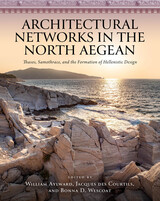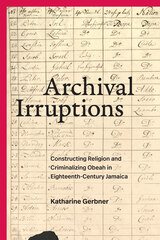7 books about Racism and the arts
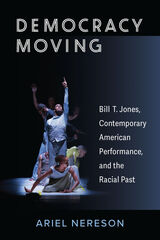
Democracy Moving
Bill T. Jones, Contemporary American Performance, and the Racial Past
Ariel Nereson
University of Michigan Press, 2022
On the 200th anniversary of Abraham Lincoln’s birth, renowned choreographer and director Bill T. Jones developed three tributes: Serenade/The Proposition, 100 Migrations, and Fondly Do We Hope . . . Fervently Do We Pray. These widely acclaimed dance works incorporated video and audio text from Lincoln’s writings as they examined key moments in his life and his enduring legacy. Democracy Moving explores how these works provided both an occasion and a method by which democracy and history might be reconceived through movement, positioning dance as a form of both history and historiography.
The project addresses how different communities choose to commemorate historical figures, events, and places through art—whether performance, oratory, song, statuary, or portraiture—and in particular, Black US American counter-memorial practices that address histories of slavery. Advancing the theory of oscillation as Black aesthetic praxis, author Ariel Nereson celebrates Bill T. Jones as a public intellectual whose practice has contributed to the project of understanding America’s relationship to its troubled past. The book features materials from Bill T. Jones/Arnie Zane Company’s largely unexplored archive, interviews with artists, and photos that document this critical stage of Jones’s career as it explores how aesthetics, as ideas in action, can imagine more just and equitable social formations.
The project addresses how different communities choose to commemorate historical figures, events, and places through art—whether performance, oratory, song, statuary, or portraiture—and in particular, Black US American counter-memorial practices that address histories of slavery. Advancing the theory of oscillation as Black aesthetic praxis, author Ariel Nereson celebrates Bill T. Jones as a public intellectual whose practice has contributed to the project of understanding America’s relationship to its troubled past. The book features materials from Bill T. Jones/Arnie Zane Company’s largely unexplored archive, interviews with artists, and photos that document this critical stage of Jones’s career as it explores how aesthetics, as ideas in action, can imagine more just and equitable social formations.
[more]
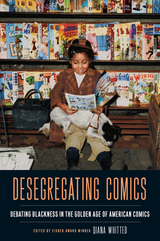
Desegregating Comics
Debating Blackness in the Golden Age of American Comics
Qiana Whitted
Rutgers University Press, 2023
Winner of the Comics Studies Society Edited Book Prize
Shortlisted for the Best Academic / Scholarly Work Eisner Award
Honorable Mention for the Harry Shaw and Katrina Hazzard-Donald Award for Outstanding Work in African-American Popular Culture Studies from the Popular Culture Association
Some comics fans view the industry’s Golden Age (1930s-1950s) as a challenging time when it comes to representations of race, an era when the few Black characters appeared as brutal savages, devious witch doctors, or unintelligible minstrels. Yet the true portrait is more complex and reveals that even as caricatures predominated, some Golden Age comics creators offered more progressive and nuanced depictions of Black people.
Desegregating Comics assembles a team of leading scholars to explore how debates about the representation of Blackness shaped both the production and reception of Golden Age comics. Some essays showcase rare titles like Negro Romance and consider the formal innovations introduced by Black comics creators like Matt Baker and Alvin Hollingsworth, while others examine the treatment of race in the work of such canonical cartoonists as George Herriman and Will Eisner. The collection also investigates how Black fans read and loved comics, but implored publishers to stop including hurtful stereotypes. As this book shows, Golden Age comics artists, writers, editors, distributors, and readers engaged in heated negotiations over how Blackness should be portrayed, and the outcomes of those debates continue to shape popular culture today.
Shortlisted for the Best Academic / Scholarly Work Eisner Award
Honorable Mention for the Harry Shaw and Katrina Hazzard-Donald Award for Outstanding Work in African-American Popular Culture Studies from the Popular Culture Association
Some comics fans view the industry’s Golden Age (1930s-1950s) as a challenging time when it comes to representations of race, an era when the few Black characters appeared as brutal savages, devious witch doctors, or unintelligible minstrels. Yet the true portrait is more complex and reveals that even as caricatures predominated, some Golden Age comics creators offered more progressive and nuanced depictions of Black people.
Desegregating Comics assembles a team of leading scholars to explore how debates about the representation of Blackness shaped both the production and reception of Golden Age comics. Some essays showcase rare titles like Negro Romance and consider the formal innovations introduced by Black comics creators like Matt Baker and Alvin Hollingsworth, while others examine the treatment of race in the work of such canonical cartoonists as George Herriman and Will Eisner. The collection also investigates how Black fans read and loved comics, but implored publishers to stop including hurtful stereotypes. As this book shows, Golden Age comics artists, writers, editors, distributors, and readers engaged in heated negotiations over how Blackness should be portrayed, and the outcomes of those debates continue to shape popular culture today.
[more]

FUTURE/PRESENT
Arts in a Changing America
Daniela Alvarez, Roberta Uno, and Elizabeth M. Webb, editors
Duke University Press, 2024
FUTURE/PRESENT brings together a vast collection of writers, artists, activists, and academics working at the forefront of today’s most pressing struggles for cultural equity and racial justice in a demographically changing America. The volume builds upon five years of national organizing by Arts in a Changing America, an artist-led initiative that challenges structural racism by centering people of color who are leading innovation at the nexus of arts production, community benefit, and social change. FUTURE/PRESENT includes a range of essays and criticism, visual and performance art, artist manifestos, interviews, poetry, and reflections on community practice. Throughout, contributors examine issues of placekeeping and belonging, migration and diasporas, the carceral state, renegotiating relationships with land, ancestral knowledge as radical futurity, and shifting paradigms of inequity. Foregrounding the powerful resilience of communities of color, FUTURE/PRESENT advances the role of artists as first responders to injustices, creative stewards in the cohesion and health of communities, and innovative strategists for equity.
Selected contributors. Dahlak Brathwaite, adrienne maree brown, Jeff Chang, Tameca Cole, Ofelia Esparza, Antoine Hunter, Nobuko Miyamoto, Wendy Red Star, Spel, Jose Antonio Vargas, Carrie Mae Weems, Hinaleimoana Kwai Kong Wong-Kalu
Selected contributors. Dahlak Brathwaite, adrienne maree brown, Jeff Chang, Tameca Cole, Ofelia Esparza, Antoine Hunter, Nobuko Miyamoto, Wendy Red Star, Spel, Jose Antonio Vargas, Carrie Mae Weems, Hinaleimoana Kwai Kong Wong-Kalu
[more]
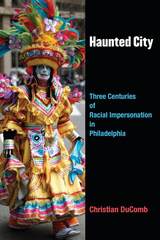
Haunted City
Three Centuries of Racial Impersonation in Philadelphia
Christian DuComb
University of Michigan Press, 2017
Haunted City explores the history of racial impersonation in Philadelphia from the late eighteenth century through the present day. The book focuses on select historical moments, such as the advent of the minstrel show and the ban on blackface makeup in the Philadelphia Mummers Parade, when local performances of racial impersonation inflected regional, national, transnational, and global formations of race.
Mummers have long worn blackface makeup during winter holiday celebrations in Europe and North America; in Philadelphia, mummers’ blackface persisted from the colonial period well into the twentieth century. The first annual Mummers Parade, a publicly sanctioned procession from the working-class neighborhoods of South Philadelphia to the city center, occurred in 1901. Despite a ban on blackface in the Mummers Parade after civil rights protests in 1963–64, other forms of racial and ethnic impersonation in the parade have continued to flourish unchecked. Haunted City combines detailed historical research with the author’s own experiences performing in the Mummers Parade to create a lively and richly illustrated narrative. Through its interdisciplinary approach, Haunted City addresses not only theater history and performance studies but also folklore, American studies, critical race theory, and art history. It also offers a fresh take on the historiography of the antebellum minstrel show.
Mummers have long worn blackface makeup during winter holiday celebrations in Europe and North America; in Philadelphia, mummers’ blackface persisted from the colonial period well into the twentieth century. The first annual Mummers Parade, a publicly sanctioned procession from the working-class neighborhoods of South Philadelphia to the city center, occurred in 1901. Despite a ban on blackface in the Mummers Parade after civil rights protests in 1963–64, other forms of racial and ethnic impersonation in the parade have continued to flourish unchecked. Haunted City combines detailed historical research with the author’s own experiences performing in the Mummers Parade to create a lively and richly illustrated narrative. Through its interdisciplinary approach, Haunted City addresses not only theater history and performance studies but also folklore, American studies, critical race theory, and art history. It also offers a fresh take on the historiography of the antebellum minstrel show.
[more]
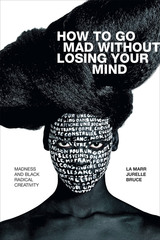
How to Go Mad without Losing Your Mind
Madness and Black Radical Creativity
La Marr Jurelle Bruce
Duke University Press, 2020
“Hold tight. The way to go mad without losing your mind is sometimes unruly.” So begins La Marr Jurelle Bruce's urgent provocation and poignant meditation on madness in black radical art. Bruce theorizes four overlapping meanings of madness: the lived experience of an unruly mind, the psychiatric category of serious mental illness, the emotional state also known as “rage,” and any drastic deviation from psychosocial norms. With care and verve, he explores the mad in the literature of Amiri Baraka, Gayl Jones, and Ntozake Shange; in the jazz repertoires of Buddy Bolden, Sun Ra, and Charles Mingus; in the comedic performances of Richard Pryor and Dave Chappelle; in the protest music of Nina Simone, Lauryn Hill, and Kendrick Lamar, and beyond. These artists activate madness as content, form, aesthetic, strategy, philosophy, and energy in an enduring black radical tradition. Joining this tradition, Bruce mobilizes a set of interpretive practices, affective dispositions, political principles, and existential orientations that he calls “mad methodology.” Ultimately, How to Go Mad without Losing Your Mind is both a study and an act of critical, ethical, radical madness.
[more]
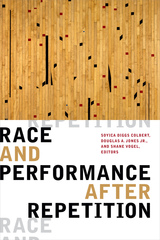
Race and Performance after Repetition
Soyica Diggs Colbert, Douglas A. Jones Jr., and Shane Vogel, editors
Duke University Press, 2020
The contributors to Race and Performance after Repetition explore how theater and performance studies account for the complex relationship between race and time. Pointing out that repetition has been the primary point of reference for understanding both the complex temporality of theater and the historical persistence of race, they identify and pursue critical alternatives to the conceptualization, organization, measurement, and politics of race in performance. The contributors examine theater, performance art, music, sports, dance, photography, and other forms of performance in topics that range from the movement of boxer Joe Louis to George C. Wolfe's 2016 reimagining of the 1921 all-black musical comedy Shuffle Along to the relationship between dance, mourning, and black adolescence in Flying Lotus's music video “Never Catch Me.” Proposing a spectrum of coexisting racial temporalities that are not tethered to repetition, this collection reconsiders central theories in performance studies in order to find new understandings of race.
Contributors. Joshua Chambers-Letson, Soyica Diggs Colbert, Nicholas Fesette, Patricia Herrera, Jasmine Elizabeth Johnson, Douglas A. Jones Jr., Mario LaMothe, Daphne P. Lei, Jisha Menon, Tavia Nyong’o, Tina Post, Elizabeth W. Son, Shane Vogel, Catherine M. Young, Katherine Zien
Contributors. Joshua Chambers-Letson, Soyica Diggs Colbert, Nicholas Fesette, Patricia Herrera, Jasmine Elizabeth Johnson, Douglas A. Jones Jr., Mario LaMothe, Daphne P. Lei, Jisha Menon, Tavia Nyong’o, Tina Post, Elizabeth W. Son, Shane Vogel, Catherine M. Young, Katherine Zien
[more]
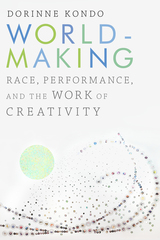
Worldmaking
Race, Performance, and the Work of Creativity
Dorinne Kondo
Duke University Press, 2018
In this bold, innovative work, Dorinne Kondo theorizes the racialized structures of inequality that pervade theater and the arts. Grounded in twenty years of fieldwork as dramaturg and playwright, Kondo mobilizes critical race studies, affect theory, psychoanalysis, and dramatic writing to trenchantly analyze theater's work of creativity as theory: acting, writing, dramaturgy. Race-making occurs backstage in the creative process and through economic forces, institutional hierarchies, hiring practices, ideologies of artistic transcendence, and aesthetic form. For audiences, the arts produce racial affect--structurally over-determined ways affect can enhance or diminish life. Upending genre through scholarly interpretation, vivid vignettes, and Kondo's original play, Worldmaking journeys from an initial romance with theater that is shattered by encounters with racism, toward what Kondo calls reparative creativity in the work of minoritarian artists Anna Deavere Smith, David Henry Hwang, and the author herself. Worldmaking performs the potential for the arts to remake worlds, from theater worlds to psychic worlds to worldmaking visions for social transformation.
[more]
READERS
Browse our collection.
PUBLISHERS
See BiblioVault's publisher services.
STUDENT SERVICES
Files for college accessibility offices.
UChicago Accessibility Resources
home | accessibility | search | about | contact us
BiblioVault ® 2001 - 2025
The University of Chicago Press




